‘Keep Ideals Alive’: Washington Vigil Pays Tribute to Chinese Students Killed in Tiananmen Square Massacre
WASHINGTON—A Chinese man stood quietly by himself at the Victim of Communism Memorial at dusk on June 2. It’s that time of the year again. A candlelight vigil commemorating the students who died in Tiananmen Square on June 4, 1989, was about to start. [embedded content] A survivor of the Chinese student democracy movement that ended with bloodshed in Tiananmen, James Wang, left the Square on the night of June 3, 1989, after military loudspeakers warned students who had occupied there for weeks that soldiers were about to “clear the field.” Shortly after, the slaughter began. By the early morning of June 4, tanks and troops had cleared the area. Hundreds of students, if not more, were killed. James Wang is an alias he uses for his safety. When he joined the movement, he didn’t expect that he and other students would become criminals in the eyes of the Chinese Communist Party (CCP). Instead, he had hoped that the CCP, particularly the then reform-minded Party chief Zhao Ziyang, would move China in a direction with more reforms and, eventually, democracy. Then, in that light, the students’ efforts would serve as an additional push. Zhao, who expressed sympathy to the student protestors, was put under 16 years of house arrest until he died in 2005. Now, Wang doesn’t think the CCP will ever bring democracy to China. He doesn’t even want to call for the CCP to restore the reputation of the students who died in Tiananmen Square. “The CCP is bad, and the students are the good people,” he told The Epoch Times. “How is it possible for bad people to restore the reputation of good people?” June 4 signifies the Chinese people’s yearning for democracy and freedom in Wang’s view. The wish for a better China still burns in his heart. He considers people’s freedom and happiness as the key indicator of China’s improvement, and where China stands on that is shown by the status of a Chinese passport: the number of countries willing to receive Chinese tourists without requiring a visa. He said aircraft carriers and fighter jets don’t necessarily win international credibility and respect for China, but a happy population would do. Frank Wolf, a commissioner of the U.S. Commission on International Religious Freedom (USCIRF) and former Virginia congressman, and wife Carolyn Wolf attend a candlelight vigil mourning the victims of the 1989 Tiananmen Square massacre in Washington on June 2, 2023. (Madalina Vasiliu/The Epoch Times) ‘Equal Opportunity Persecutor’ Frank Wolf, a commissioner of the U.S. Commission on International Religious Freedom (USCIRF) and former Virginia congressman, told The Epoch Times that remembering the Tiananmen Square massacre is “very significant” because the CCP’s oppression of the Chinese people “really began with the crackdown in Tiananmen. So, it’s a big deal, and the American people feel strongly about it.” Speaking to the vigil participants, he called the CCP an “equal opportunity persecutor of faith,” referring to its persecution of Christians, Tibetans, Uyghurs, and Falun Gong practitioners. During his visit to the Beijing Municipal No. 1 Prison in 1991, Wolf learned that the facility incarcerated 40 inmates who had participated in the Tiananmen Square protest in June 1989. The prison factory subjected detainees to making socks for export. He called for the Biden administration and Congress to ban any lobbying activity on behalf of the CCP in America. “From the Eisenhower, Kennedy, Carter, and Reagan Administrations, it would have been unthinkable for any reputable firm to take on the Soviet Union as a client,” he said at the vigil. “Yet today, untold profits are being raked in by lobbyists and law firms representing the Chinese communist government and Chinese-controlled companies, whitewashing the abuses and aims of the CCP.” Yang Jianli, president of Citizen Power Initiatives for China, speaks during a candlelight vigil mourning the victims of the 1989 Tiananmen Square massacre in Washington on June 2, 2023. (Madalina Vasiliu/The Epoch Times) ‘Keep Ideals Alive’ Yang Jianli, president of the advocacy group Citizen Power Initiatives for China, saw the spirit of the 1989 student democracy movement continue in the white paper movement late last year. A deadly fire at a high-rise apartment building in Urumqi, the capital of China’s western Xinjiang region, triggered the protests last November. Residents blamed the pandemic controls for delaying fire response and causing deaths; many believe the number to be much higher than the official tally of 10. People held a blank sheet of white paper to protest the CCP’s draconian COVID lockdowns and the lack of freedom of speech. Over 19 cities, including Beijing and Shanghai, saw breakouts of demonstrations to honor the dead and to express discontent. “Just as the students in Tiananmen Square did decades ago, today’s young activists are demanding transparency, accountability, and political freedoms,” Yang said at the event. “The whi
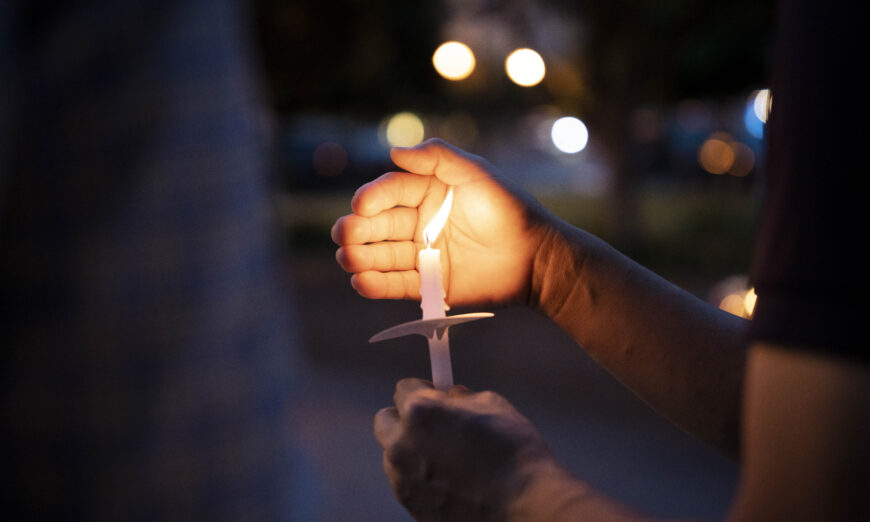
WASHINGTON—A Chinese man stood quietly by himself at the Victim of Communism Memorial at dusk on June 2. It’s that time of the year again. A candlelight vigil commemorating the students who died in Tiananmen Square on June 4, 1989, was about to start.
[embedded content]
A survivor of the Chinese student democracy movement that ended with bloodshed in Tiananmen, James Wang, left the Square on the night of June 3, 1989, after military loudspeakers warned students who had occupied there for weeks that soldiers were about to “clear the field.”
Shortly after, the slaughter began. By the early morning of June 4, tanks and troops had cleared the area. Hundreds of students, if not more, were killed.
James Wang is an alias he uses for his safety. When he joined the movement, he didn’t expect that he and other students would become criminals in the eyes of the Chinese Communist Party (CCP). Instead, he had hoped that the CCP, particularly the then reform-minded Party chief Zhao Ziyang, would move China in a direction with more reforms and, eventually, democracy. Then, in that light, the students’ efforts would serve as an additional push.
Zhao, who expressed sympathy to the student protestors, was put under 16 years of house arrest until he died in 2005.
Now, Wang doesn’t think the CCP will ever bring democracy to China. He doesn’t even want to call for the CCP to restore the reputation of the students who died in Tiananmen Square. “The CCP is bad, and the students are the good people,” he told The Epoch Times. “How is it possible for bad people to restore the reputation of good people?”
June 4 signifies the Chinese people’s yearning for democracy and freedom in Wang’s view. The wish for a better China still burns in his heart.
He considers people’s freedom and happiness as the key indicator of China’s improvement, and where China stands on that is shown by the status of a Chinese passport: the number of countries willing to receive Chinese tourists without requiring a visa. He said aircraft carriers and fighter jets don’t necessarily win international credibility and respect for China, but a happy population would do.
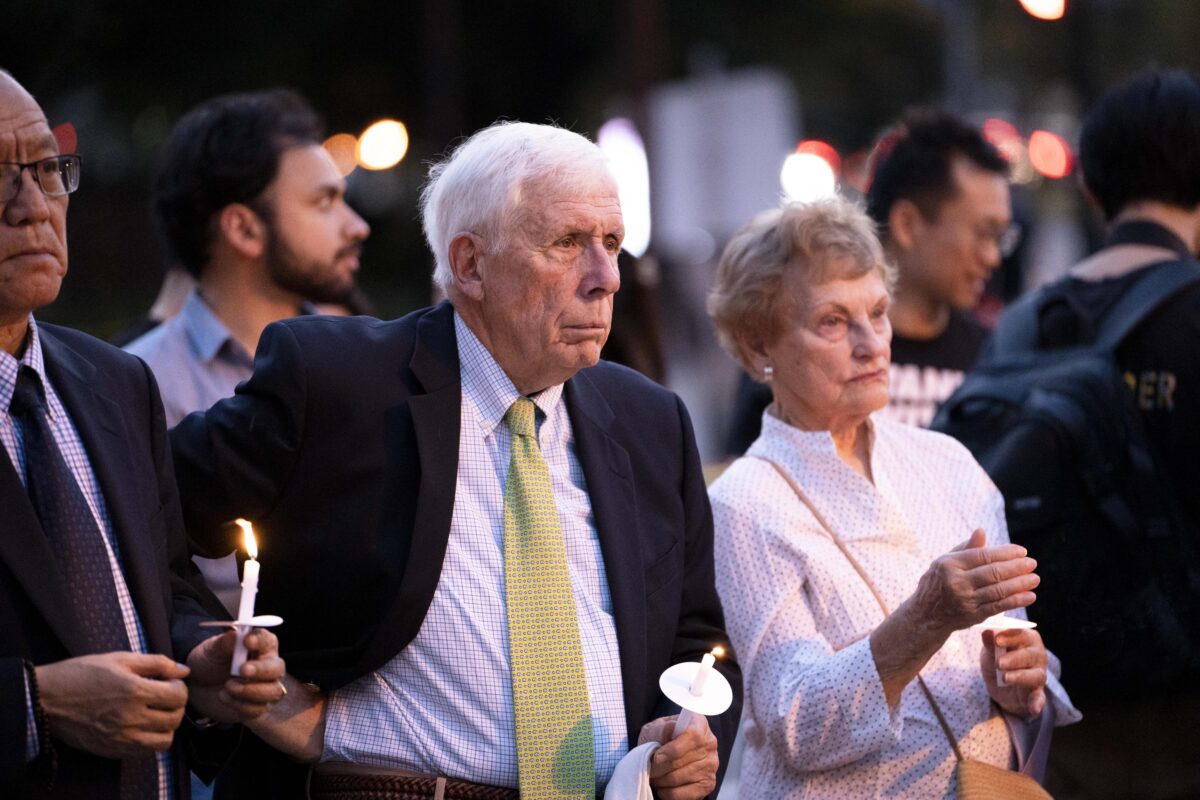
‘Equal Opportunity Persecutor’
Frank Wolf, a commissioner of the U.S. Commission on International Religious Freedom (USCIRF) and former Virginia congressman, told The Epoch Times that remembering the Tiananmen Square massacre is “very significant” because the CCP’s oppression of the Chinese people “really began with the crackdown in Tiananmen. So, it’s a big deal, and the American people feel strongly about it.”
Speaking to the vigil participants, he called the CCP an “equal opportunity persecutor of faith,” referring to its persecution of Christians, Tibetans, Uyghurs, and Falun Gong practitioners.
During his visit to the Beijing Municipal No. 1 Prison in 1991, Wolf learned that the facility incarcerated 40 inmates who had participated in the Tiananmen Square protest in June 1989. The prison factory subjected detainees to making socks for export.
He called for the Biden administration and Congress to ban any lobbying activity on behalf of the CCP in America. “From the Eisenhower, Kennedy, Carter, and Reagan Administrations, it would have been unthinkable for any reputable firm to take on the Soviet Union as a client,” he said at the vigil. “Yet today, untold profits are being raked in by lobbyists and law firms representing the Chinese communist government and Chinese-controlled companies, whitewashing the abuses and aims of the CCP.”
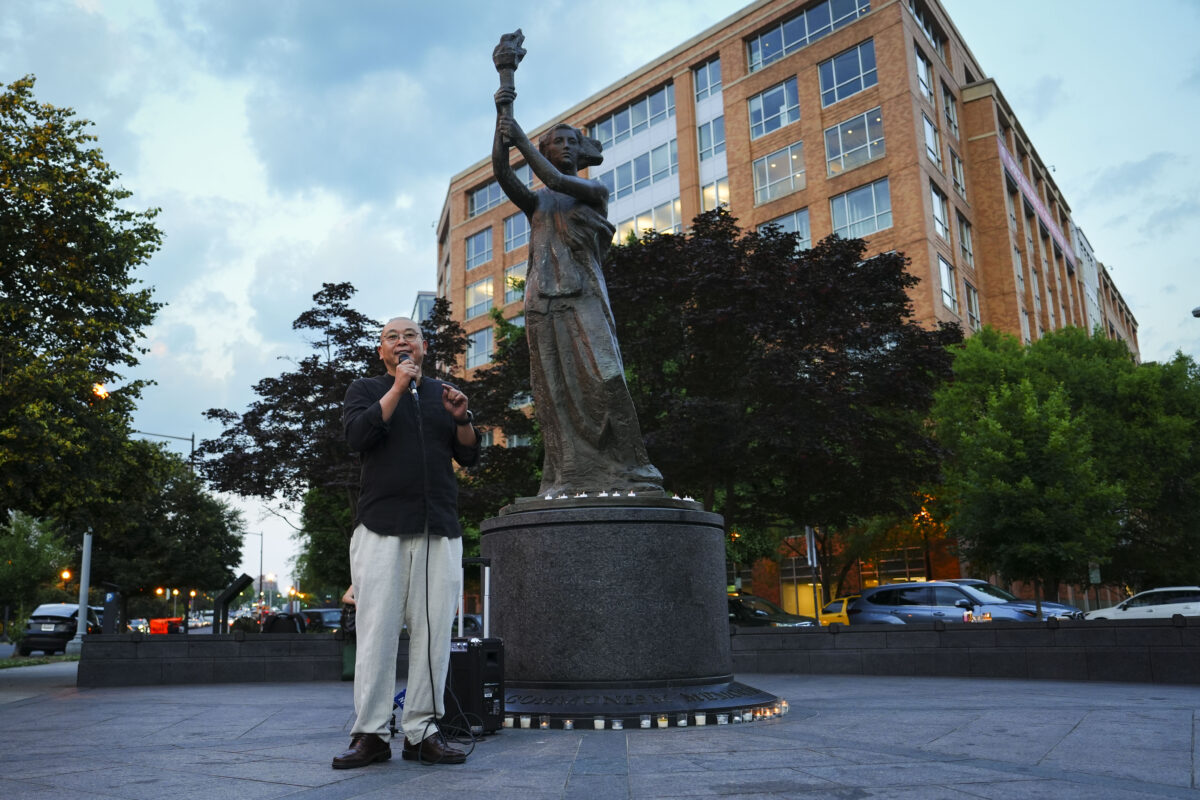
‘Keep Ideals Alive’
Yang Jianli, president of the advocacy group Citizen Power Initiatives for China, saw the spirit of the 1989 student democracy movement continue in the white paper movement late last year. A deadly fire at a high-rise apartment building in Urumqi, the capital of China’s western Xinjiang region, triggered the protests last November. Residents blamed the pandemic controls for delaying fire response and causing deaths; many believe the number to be much higher than the official tally of 10.
People held a blank sheet of white paper to protest the CCP’s draconian COVID lockdowns and the lack of freedom of speech. Over 19 cities, including Beijing and Shanghai, saw breakouts of demonstrations to honor the dead and to express discontent.
“Just as the students in Tiananmen Square did decades ago, today’s young activists are demanding transparency, accountability, and political freedoms,” Yang said at the event. “The white paper movement echoes the spirit of Tiananmen; it serves as a powerful reminder that the fight for freedom and democracy is ongoing in China, and the ideals of Tiananmen still resonates deeply within the heart of Chinese people.”
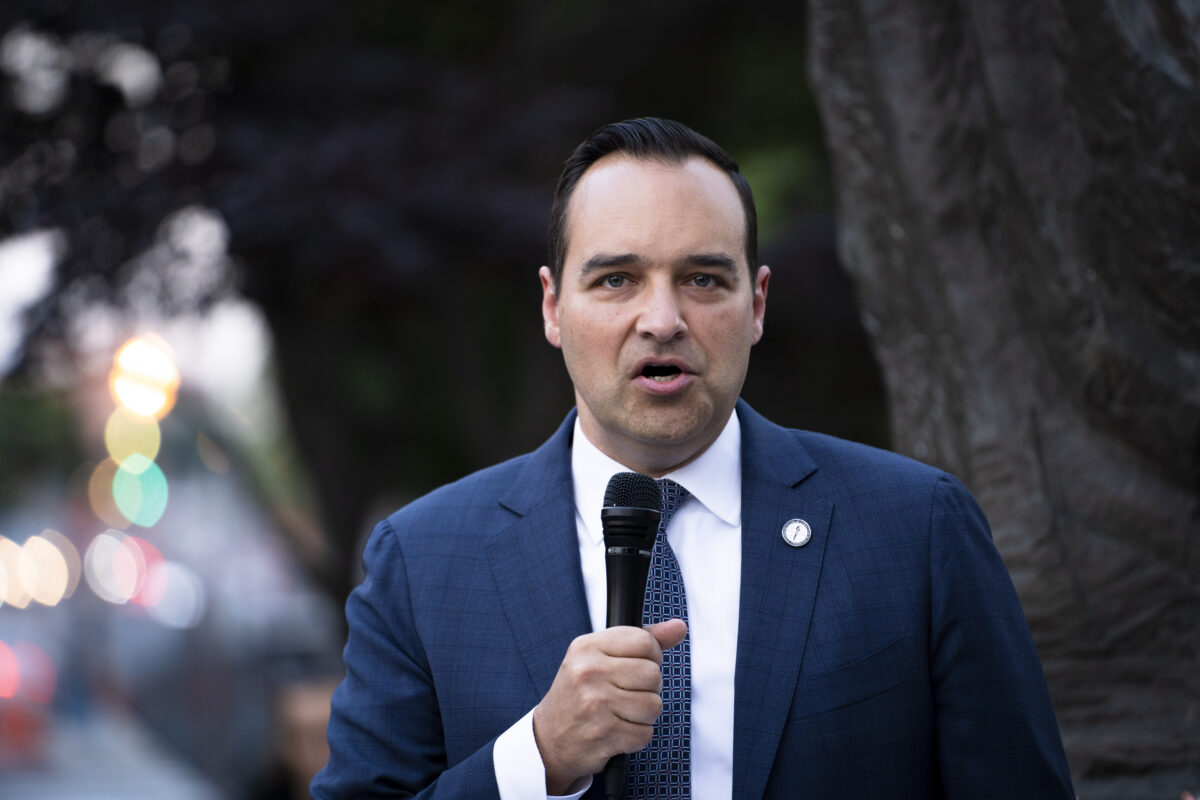
Takahiro came from China last year to study at a university in the Washington, D.C., metropolitan area and was among the audience. To protect his family members still in China, he accepted the interview on condition of using an alias.
The candlelight vigil was his first time commemorating in person those who died in the Tiananmen Square massacre. He said he joined the event with “mixed feelings.” “China’s destiny is filled with tribulations,” he told The Epoch Times, adding that the significance of the vigil is to “keep the ideals alive.”
In his opinion, the international society isn’t sufficiently alert to the harm of the CCP.
“As a Chinese passport holder, I’m somehow conflicted,” he said, adding that he wasn’t clear about exactly what he wanted from the United States on China. “Too much international clampdown on the CCP will affect me. However, if the containment is not strong enough, it won’t work.”
The student democracy movement happened before he was born. He said he admired the students who sacrificed themselves for democracy in China and thought they were too naïve to believe that the CCP would listen and make changes. However, he acknowledged that the social climate might have been very different in the 1980s.
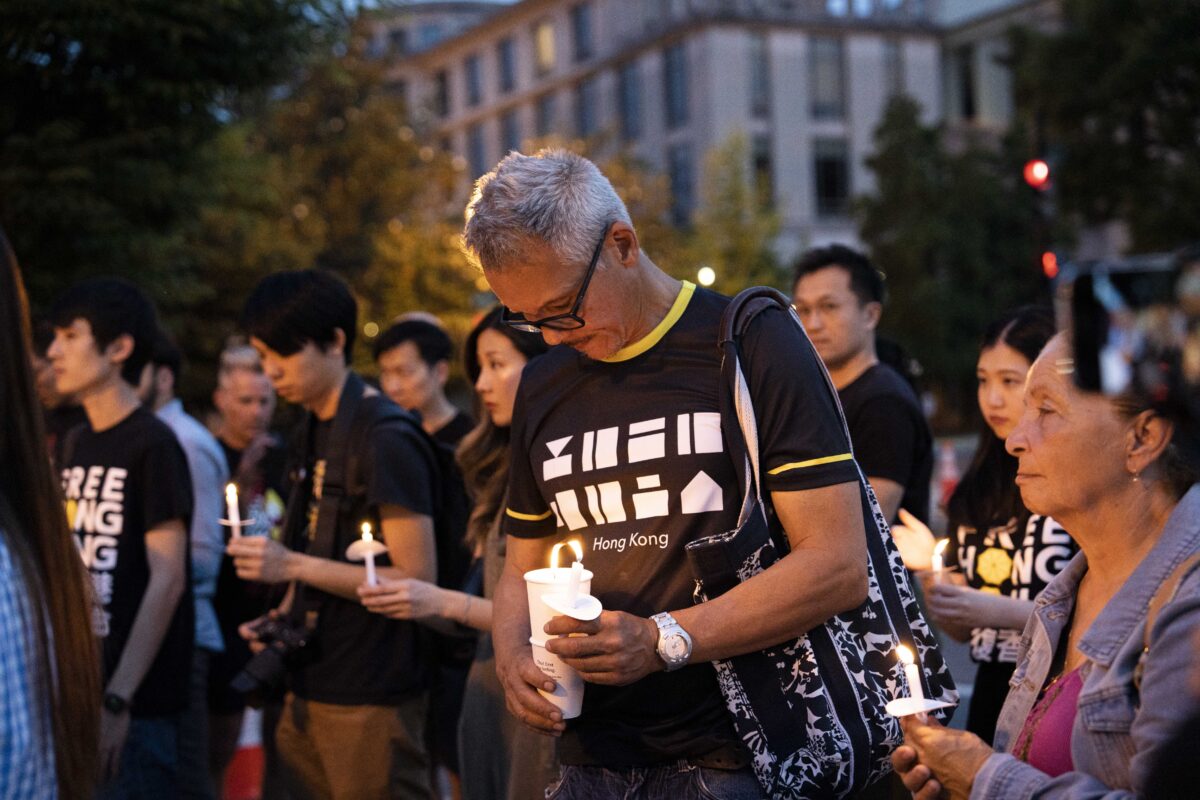
Brian Kern, an American in China in 1989 and in Hong Kong during the pro-democracy protests in 2019 and 2020, still remembers the China of June 1989.
Then, Kern, a member of DC4HK, a D.C.-based activist group that promotes freedom in Hong Kong, taught English at a university in Zhengzhou, the capital of Henan Province in central China. He said most of his students took part in the democracy movement by either protesting locally or in Beijing. As a result, some were killed in Beijing, and many were retaliated against afterward by being assigned to work units in remote areas upon graduation, according to him.
“For me, June 4 is to remember the beautiful China of 1989 and that time of promise and hope, and the beautiful young people who loved their country in a very pure, non-violent, non-nationalistic way,” he told The Epoch Times. “And where is that China? I would love to see it again.”












